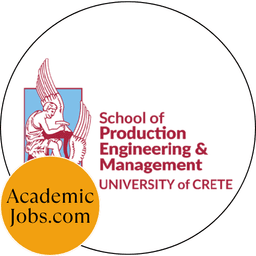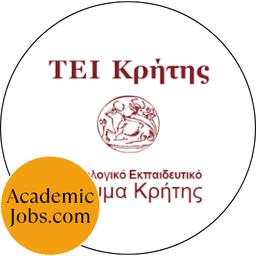Higher Education Jobs in Crete
Crete, the largest island in Greece, offers vibrant academic opportunities with a unique blend of history, culture, and innovation. Known for its prestigious institutions, Crete is a hub for higher education in the Mediterranean, attracting academics and researchers from around the world. The island's academic landscape is shaped by institutions focusing on archaeology, marine sciences, and technology, reflecting its rich heritage and strategic location. Whether you're seeking professor positions in Crete or exploring research jobs in Crete, this region provides a dynamic environment for academic careers. Discover professor ratings and connect with the academic community through Rate My Professor on AcademicJobs.com.
Crete's universities are renowned for their contributions to global research, particularly in areas like environmental studies and cultural heritage. The academic community here benefits from a supportive network of international collaborations. Explore careers and resources tailored to Crete University Jobs at AcademicJobs.com, your premier destination for higher education opportunities in Greece.
Top Universities in Crete:
Faculty Job Opportunities in Crete
Crete offers a wealth of opportunities for those pursuing academic careers in Crete. High-demand roles include Assistant Professor, Lecturer, and Research Fellow, particularly in fields such as archaeology, marine biology, and computer science. Tenure-track positions are available at leading institutions, with many universities prioritizing interdisciplinary research. Salaries for faculty jobs in Crete vary by institution and experience, with Assistant Professors earning approximately €25,000–€35,000 annually, while full Professors can earn between €40,000–€60,000 per year, based on recent data for Greek academia adjusted for regional factors. The demand for academic professionals in Crete is growing, especially in areas tied to the island's unique environmental and cultural resources.
Crete's academic institutions often collaborate with European research networks, offering unique opportunities for funding and international exposure. Roles in higher education jobs in Crete also include administrative positions like Department Chairs and Deans, which come with additional responsibilities and compensation. For those exploring lecturer roles in Crete, part-time and adjunct positions provide flexibility alongside research commitments. AcademicJobs.com offers a comprehensive platform to explore these opportunities, with job listings filtered specifically for Crete. Whether you're starting your career or seeking advancement, find the best faculty jobs in Crete through AcademicJobs.com.
Why Pursue a Career in Crete Academia
Academic careers in Crete offer a unique blend of intellectual stimulation and cultural immersion. The island is home to cutting-edge research in marine sciences, renewable energy, and cultural heritage, providing ample opportunities for impactful work. Faculty in Crete benefit from proximity to historical landmarks like Knossos, which inspire research in archaeology and history. Additionally, the region's universities foster a collaborative environment, often partnering with international institutions for groundbreaking projects. Pursuing professor positions in Crete means contributing to a legacy of knowledge while enjoying a Mediterranean lifestyle. Explore these opportunities at AcademicJobs.com.
Salary Guide for Faculty in Crete
Faculty salaries in Crete are influenced by role, experience, and institution type. Based on recent data for Greek academia, adjusted for regional economic factors, Assistant Professors in Crete typically earn between €25,000 and €35,000 annually 📊. Associate Professors see salaries ranging from €35,000 to €45,000, while full Professors can expect €40,000 to €60,000 per year. These figures may vary depending on whether the institution is public or private, with public universities adhering to national pay scales. Additional income can come from research grants, consulting, or international projects, which are common in Crete due to its strategic location 📍.
Cost of living adjustments also play a role, as Crete's expenses are generally lower than in mainland urban centers like Athens. However, seasonal tourism can impact housing costs, particularly in popular areas like Heraklion or Chania. Faculty with advanced degrees or specialized skills in high-demand fields like technology or environmental science may negotiate higher salaries. AcademicJobs.com provides resources to explore salaries in Crete academia through salary guides, helping you make informed career decisions. Understanding these ranges is crucial for academics planning a move to Crete, ensuring financial expectations align with local standards.
Weather and Climate in Crete
Crete enjoys a Mediterranean climate with mild, wet winters and hot, dry summers ☀️. Average temperatures range from 12°C (54°F) in January to 27°C (81°F) in July, based on historical weather data from sources like the Hellenic National Meteorological Service. Summers are ideal for outdoor activities, with long sunny days, while winters bring occasional rain, particularly in mountainous areas. This climate impacts academic life by allowing year-round campus events and research expeditions, especially for fields like marine biology and archaeology, which benefit from Crete's coastal and historical sites.
For newcomers to Crete, the weather offers a pleasant backdrop to academic work, though summer heat can require adjustments for those unaccustomed to high temperatures. Many university facilities are equipped with air conditioning, and the island's breezy coastal areas provide relief. The best times for campus visits are spring (April-May) and autumn (September-October), when temperatures are moderate, and tourist crowds are thinner. The climate also supports a vibrant outdoor lifestyle, with beaches and hiking trails accessible year-round. Understanding Crete's weather patterns is essential for planning academic schedules and fieldwork, ensuring a seamless integration into the island's academic community.
Work Environments in Crete Universities
Work environments in Crete's universities are characterized by a blend of traditional Greek hospitality and modern academic rigor. Campuses often feature state-of-the-art facilities for research, particularly in sciences and humanities, reflecting the island's focus on innovation and heritage. Faculty report a collaborative atmosphere, with opportunities for interdisciplinary projects and international partnerships. Work-life balance is a priority, with many institutions supporting hybrid work options for administrative tasks, allowing academics to enjoy Crete's natural beauty and cultural offerings.
Diversity initiatives are gaining traction, with universities in Crete welcoming international faculty and students, fostering a global perspective. Employee satisfaction is often tied to the island's relaxed pace of life, though workloads can be intense during research deadlines or tourist-heavy semesters. Urban amenities in cities like Heraklion, combined with proximity to stunning landscapes, enhance the appeal of working in Crete. AcademicJobs.com connects you to insights on work environments through career advice, ensuring you're prepared for the unique dynamics of Crete's academic institutions.
Lifestyle and Cost of Living in Crete
Crete offers a high quality of life for academics, with a cost of living generally lower than in major European cities. Average monthly rent for a one-bedroom apartment in city centers like Heraklion ranges from €400 to €600, while outside urban areas, it drops to €300–€450, based on recent data from Numbeo. Groceries and dining are affordable, with a meal at an inexpensive restaurant costing around €10–€15. Public transportation is accessible, though many prefer personal vehicles due to the island's rural areas. Cultural attractions, from ancient Minoan sites to modern festivals, enrich daily life.
The lifestyle in Crete is a major draw for academics, offering a blend of vibrant arts scenes, outdoor activities like hiking in the Samaria Gorge, and beachside relaxation. The island's Mediterranean diet, featuring fresh seafood and olive oil, supports a healthy lifestyle. Compared to national averages in Greece, Crete's costs are competitive, though seasonal tourism can inflate prices in summer. AcademicJobs.com helps you navigate these factors with resources on living in Crete, ensuring a smooth transition to this unique academic destination.
Rate My Professor: Top Educators in Crete
Finding the right educators is key to a successful academic journey in Crete. With Rate My Professor on AcademicJobs.com, you can explore student feedback on professors across Crete's top universities. This platform helps students and faculty alike identify inspiring educators and make informed decisions about courses. Whether you're a student planning your semester or a job seeker researching departmental culture, professor ratings in Crete provide valuable insights into teaching quality and mentorship.
Career Progression in Crete Academia
Career paths in Crete academia typically follow a progression from Lecturer to Assistant Professor, Associate Professor, and finally full Professor. Tenure-track positions are competitive but rewarding, often tied to research output and teaching excellence. Salaries increase with rank, and additional funding is available through EU grants, given Crete's participation in European research networks. Local industry partnerships, especially in tourism and agriculture, offer unique research opportunities. Find tailored opportunities and career advice at AcademicJobs.com.
Research and Trends in Crete Higher Education
Crete is at the forefront of research in marine biology, renewable energy, and cultural heritage preservation. Universities prioritize interdisciplinary studies, with significant funding directed toward environmental sustainability and archaeological innovation. Collaborations with local government and industries enhance research impact, particularly in tourism-related studies. AcademicJobs.com keeps you updated on these trends through research job listings specific to Crete.
Resources for Crete Academics
- Professional associations like the Hellenic Archaeological Society 🎓
- Academic journals focusing on Mediterranean studies 📚
- Conferences on marine science and technology in Heraklion 💻
- Networking events for EU-funded research projects 🤝
Student Perspectives in Crete Higher Education
Students in Crete benefit from diverse programs in sciences and humanities, with strong career outcomes in research and industry. Selecting the right professors is crucial, and Rate My Professor on AcademicJobs.com offers insights into teaching styles. The island's weather and lifestyle also enhance student life, with affordable living and cultural immersion opportunities.




.png&w=256&q=75)



